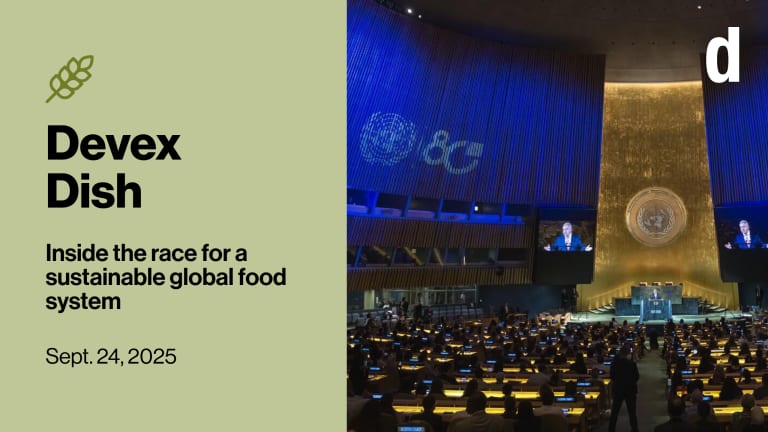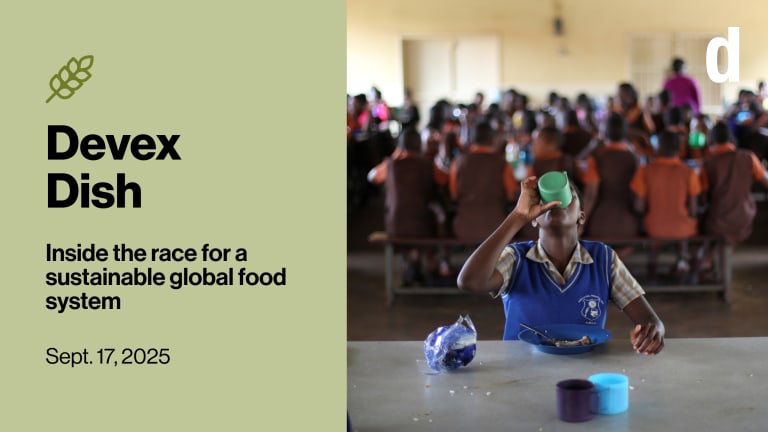
A small bureaucratic hurdle stands in the way of shipping more than 400,000 boxes of fortified peanut paste from the U.S. to severely malnourished children in countries such as Sudan and Somalia who desperately need it. Each box could prevent at least one child from dying of starvation.
In the case of Edesia, a Rhode Island-based nonprofit that produced 123,188 of those boxes, all that’s missing is a form signed by Jeremy Lewin. He’s a 28-year-old senior official with the Department of Government Efficiency — aka DOGE — who helped dismantle USAID and now heads what is left of the agency while serving as acting director of the U.S. State Department’s Office of Foreign Assistance. Edesia’s founder and CEO Navyn Salem has been chasing that signature for months.
As the Trump administration has taken a sledgehammer to U.S. foreign aid, Salem has been unusually vocal. She’s spoken to Fox News, appealed to members of Congress, and exchanged public messages with Elon Musk on his social media platform X. As of April 29, Rhode Island’s Rep. Seth Magaziner, a Democrat, has vowed to speak on the floor of the House of Representatives every day until federal funding for the peanut paste is restored.
“Despite the efforts, I worry that the next time I am in the field, I will meet the mothers of these children and have to say… ‘I am sorry for the loss of your child. I couldn’t get the paper signed in time. I tried everything I knew how to do. It wasn’t enough,’” Salem wrote in a company newsletter last weekend.
My colleague Jesse Chase-Lubitz visited the Rhode Island factory Monday and found it eerily quiet. The boxes sit in its warehouse, unable to be loaded onto a ship. “Normally, it’s like a highway here,” Salem told Jesse. Now it’s a ghost town, with the office walls still adorned with American flags and photos of the children Edesia serves.
USAID alone traditionally supported half the world’s supply of the fortified paste — known as ready-to-use therapeutic food, or RUTF. Much of it comes from just two nonprofits: Edesia and Mana Nutrition, which operates from the state of Georgia. For months organizations such as UNICEF — which distributes RUTFs and supports therapeutic centers for treatment of malnourished children — have been raising the alarm about imminent RUTF stockouts. In Ethiopia and Nigeria, UNICEF could run out as soon as this month. Funding cuts by the U.S. and other donors could leave more than 2.4 million children with severe acute malnutrition unable to access RUTFs for the rest of 2025.
And beyond the immediate problem of shipping 400,000 boxes, both Edesia and Mana are worried for their futures. Some years they rely on USAID for up to 80% of their funding. But last month, the agency said it won’t have future contracts for the two nonprofits and listed 11 countries for which projects were either “canceled” or “will not move forward at this time.” That means they cannot plan for future production, such as buying raw materials from the U.S. farmers in 27 different states where they source their ingredients.
“I cannot advise or instruct you on how this information should affect your production schedule,” reads an email from USAID that Devex reviewed. “All I can say is we currently have no demand, and soon our Agency’s operations will cease. It is uncertain what will move forward if/when any USAID operations are transferred over to the State Department.”
For now, Salem says Lewin has agreed to a meeting — and she’s hanging on to hope that she can get his signature.
Read: Why are 400,000 boxes of food for malnourished kids stuck in the US?
Background: The Trump administration’s flip-flop on treating malnourished children (Pro)
And don’t miss: ‘The system is breaking’ — US aid freeze threatens child malnutrition care
Watch: Why the US aid freeze could be a moment to reform food aid (Pro)
Hey Dish readers, we are seeking stories of how the end of USAID is disrupting food aid. Got a tip? Email me at tania.karas@devex.com.
Number munching
$1.6 billion
—That’s the entire budget of Food for Peace, the U.S. government’s flagship hunger initiative — and it’s also the amount slated to be eliminated from the program in the Trump administration’s proposed federal budget for fiscal year 2026. That would spell the end of Food for Peace, which also funds much of the work of Edesia and Mana Nutrition.
The USAID-administered program has held strong bipartisan support for decades, largely due to the fact that it buys surplus commodities from American farmers across Republican-controlled states and sends them abroad as in-kind food aid. Still, it’s been heavily criticized as well: because the program sources goods from the U.S. and sends them abroad on U.S.-flagged vessels, it often results in higher commodity and shipping prices versus buying food from farmers in local markets in the global south, write my colleagues Elissa Miolene and Adva Saldinger, who analyzed the budget proposal.
Trump’s budget states there are “far more efficient food aid programs” than Food for Peace, and that the budget preserves many of them. Despite that, the only clear international food initiatives listed in the budget — such as the McGovern-Dole Food for Education Program — are criticized for having “high costs with dubious results,” and are slated for elimination too. United Nations programs — which would encompass the World Food Programme, the Food and Agriculture Organization, and the International Fund for Agricultural Development — face steep cuts as well. The full budget still needs to be approved by Congress.
Read: Trump budget proposes unprecedented, ‘reckless’ cuts to foreign aid
+ Keep up with the latest news, analysis, and insider reporting with our coverage of how the Trump administration is reshaping U.S. foreign aid.
Rolling in the dough
The Asian Development Bank is significantly boosting its investment in food and nutrition security in Asia and the Pacific. At the bank’s annual meetings in Milan, Italy, this week, it announced $26 billion in new funding, bringing its total support for food security initiatives to $40 billion from 2022 to 2030. The funds will go toward the full food production process from farm to fork, with goals to improve nutrition, create jobs, reduce the food system’s environmental impacts, and promote resilient agricultural supply chains. A quarter of the new funding will go to nutrition-related projects.
It’s a significant acceleration in the bank’s investment in this area, writes Devex contributor Alessio Perrone. In September 2022 it pledged to invest $14 billion by 2025 to ease the regional food crisis — then spent 80% of those funds by the end of 2024. More than half the world’s undernourished people live in Asia.
Bringing home the bacon
Your next job?
Senior Strategic Campaign Director, Food Systems
Environmental Working Group
United States
Qingfeng Zhang, ADB’s senior director of the Agriculture, Food, Nature, and Rural Development Sector Office, tells Alessio that the bank is betting on food systems because development in that sector contributes to so many of its other goals — including private sector investment, climate financing, inclusive development, and poverty reduction. “If you look across the board, food system transformation is going to carry all of these key targets forward.”
Also announced in Milan was a new ADB Natural Capital Fund, a $150 million blended finance mechanism targeting agrifood systems investment, along with a new Nature and Food Partnership with the United Kingdom to encourage investments in biodiversity, ecosystems, and food system transformation.
Read: How ADB plans to invest $40B in food systems by 2030 (Pro)
+ A Devex Pro membership offers deeper analysis of the development sector, exclusive events and briefings with sector leaders on the evolving aid world, access to the world’s largest global development job board for career resources, and more. Try it out today by signing up for a 15-day free trial.
Free lunch
Meanwhile in Singapore, the world’s street food capital, talk of food systems was everywhere at this week’s Philanthropy Asia Summit, which my colleague Ayenat Mersie is attending.
One big focus? Resilience through diversity. As Danny Hunter, principal scientist with the Alliance of Bioversity International and CIAT, points out: “Only nine plants account for 70% of our food production. And really, we rely on three staple crops — rice, wheat and maize — for the bulk of our plant-related calories.” And in this region, rice — which makes up about half of calories — is king. That kind of dependence is bad not just for diets, but for the system’s ability to withstand climate and economic shocks.
One of the most fascinating discussions, Ayenat says, was an examination of Indonesia’s new school meals program, which aims to reach 80 million kids. There’s a lot at stake: Indonesia’s stunting rate is currently 19.8%, and the government wants to bring it below 10%, says Ferro Ferizka, Indonesia’s special adviser to the coordinating minister for human development and culture. And school meals can help get there while boosting economic prospects for farmers and communities along the way.
The big idea? Keep the benefits local. “We want the economy to be circulating locally,” Ferro explains, with kitchens that “empower and employ the local people.” In Java, for example, the government taps groups of mothers who don’t work outside the home, bringing them together to help cook meals for local schools.
Of course, rolling out a program across a country as massive and diverse as Indonesia isn’t easy. That’s where philanthropy and the private sector come in. Their job, Ferro says, is to help governments “pilot, experiment, and help us learn” what works so countries can scale up the best ideas. As Ferro puts it, success will come “when this free nutritious meal program becomes an economic system, not only … a food system.”
Chew on this
Children in the Gaza Strip are facing growing risk of starvation, illness, and death after two months of “relentless bombardments.” [UNICEF]
The dismantling of USAID may signal a pivotal shift from traditional foreign aid toward prioritizing industrialization and economic self-reliance in low- and middle-income countries. [Foreign Affairs]
Kenya’s ambitious climate commitments set a high standard for other countries ahead of COP30 in Brazil. [Devex]
Ayenat Mersie contributed to this edition of Devex Dish.








